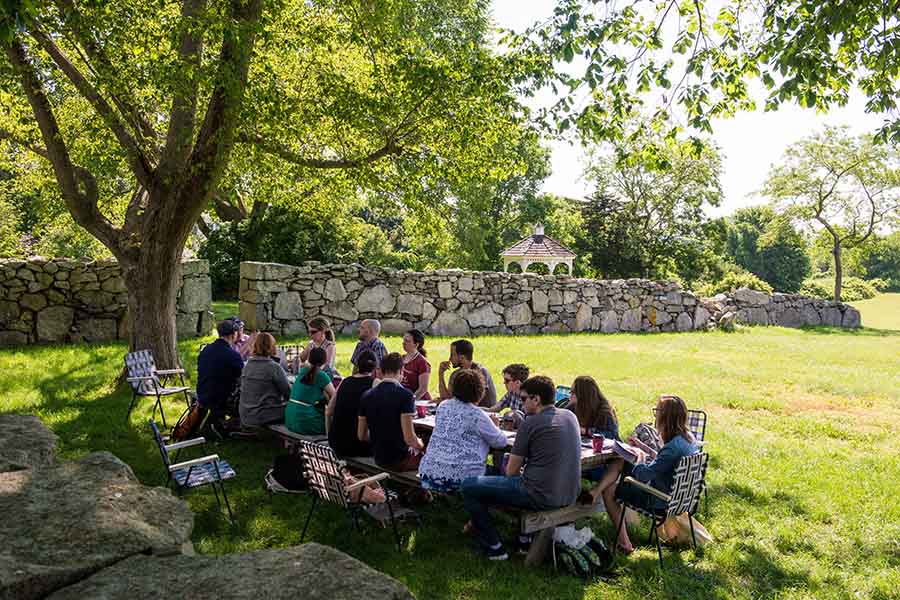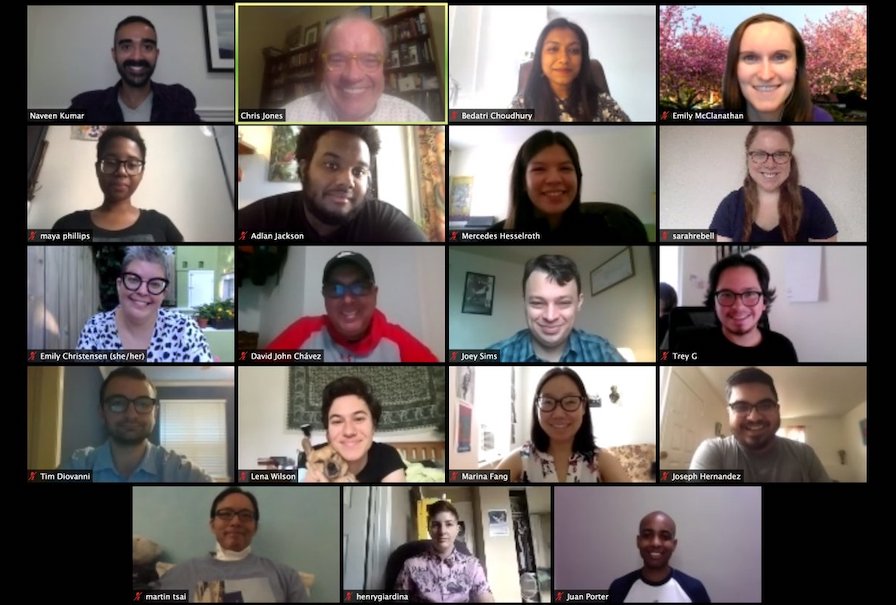I never thought of myself as a critic until I attended the National Critics Institute (NCI) this summer as a 2020 fellow. Sure, I frequently wrote about theatre, which involved interviewing people and analyzing the work they created; but in my mind, that wasn’t criticism. I was somehow convinced, despite plenty of evidence to the contrary, that being a critic meant metaphorically regulating the industry via a big thumbs up or a thumbs down, a la the website didhelikeit.com.
But, with the COVID-19 pandemic as an inescapable backdrop, NCI revealed to me the nuances of arts criticism and, especially, the importance of empathy and engagement with the world as essential elements of criticism. NCI director Chris Jones, associate director Naveen Kumar, and their special guests conveyed this lesson in five all-too-brief, thrillingly overstuffed days that took place entirely via Zoom.
In a typical summer NCI takes place over the course of two weeks, during which fellows live on the Eugene O’Neill Theater Center’s bucolic campus in Waterford, Conn., and attend readings and performances as part of the center’s concurrently running National Playwrights Conference. There is a beach, a gazebo, a library with exposed timber beams, and an ornate cottage where O’Neill himself lived as a boy. I’m told that the fellows often write their first assignment in that very cottage, which could be inspirational or intimidating, depending upon your level of anxiety. Regardless, it was certainly a much more distinguished setting than my parents’ kitchen table, where I wrote the majority of my first assignment this year. (Yes, I am one of myriad millennials currently social distancing with their parents.)
Chris and Naveen made the program’s structure and expectations clear from the outset: We couldn’t meet in person, or view live performances, but the institute would be just as intense this year as any other, even if the challenges we faced were unprecedented. Every morning, we signed onto Zoom around 9:30 a.m. ET, which meant that the writers from the West Coast had to be ready to go at 6:30 a.m. PT. We generally spent the morning meeting special guests who would share insights with us, before sending us off to write a review in their particular specialty area.
Most days we only had a few hours in which to complete our 500- to 700-word writing assignments. Then we’d log back onto Zoom, share our writing, and receive critiques from the other fellows, as well as from the day’s guest. After a dinner break, we’d return to Zoom for a session with another guest critic or watch a virtual play. On its “opening night,” we watched the Public Theater’s docu-play The Line on YouTube and wrote radio reviews, which were critiqued the next morning by WNYC’s Jennifer Vanasco, an NCI alum.
Our assignments couldn’t help but be influenced by the pandemic. Washington Post dance critic Sarah Kaufman asked us to write a dance review of a recording of a dance company’s final rehearsal for a tour that was now canceled. Long-time Chicago Tribune entertainment reporter Mark Caro had us watch a film about to celebrate its 10th anniversary, and consider how it stood the test of time, given today’s sociopolitical climate. New York Times restaurant critic Tejal Rao encouraged us to write about our experience getting takeout from a restaurant in our food reviews. (Ordinarily, NCI fellows eat out at a restaurant and are asked to review its atmosphere as well as its food.) Ignoring the existence of the pandemic would have felt disingenuous—it would have gone against the values of NCI.
“We have a moral responsibility to tell folks what is true about life as we know it,” Chris told us on the very first night of the program. The phrase “moral responsibility” stood out to me. People often scapegoat critics as amoral naysayers who take pleasure in wielding destructive power. But the job of the critic, as defined at NCI, requires empathy as well as honesty. Most of all, it requires accountability to ourselves, to our readers, and to our society.
We might be isolated in our respective quarantine bubbles right now, but the act of writing enables us to connect with our readers. Many of the guest critics spoke about the importance of conveying the experience of the show, and engaging with readers on an emotional level, so that they understand what it’s like to be at the performance just from reading the review. “Give us a sense of what the art felt like,” said Sarah Kaufman, who encouraged us to focus on the emotional impact of the dance we reviewed, instead of the literal steps and technique.
It was liberating to set aside my need as a perfectionist to appear to be omniscient (which I certainly am not). Contemplating my own emotional response to these works allowed me to trust my instincts, which led to taking more risks in my writing, and, ultimately, to coming up with reviews that felt more like me. In one instance, that meant referring to the medieval allegory of the Dance of Death; in another, it was describing making pesto as an aggressive process while providing a brief etymological analysis of basil. Potential readers might not find the online etymology dictionary as fascinating as I do, but the specificity that came from bringing my own experiences—and the open acknowledgement that I’m writing all of this during a freaking pandemic—to my pieces definitely made the writing more compelling.

But it’s not enough to just write about how we feel. We have a responsibility to check in with ourselves, to consider our own inherent biases. NCI emphasized that we’re obligated, as critics, to interpret a work of art with the humility that our truth is not definitive or universal. What we chose to focus on in a review reveals just as much about our own subjective beliefs as it does about the work itself. As Tejal Rao pointed out to us, “Reporting is deeply personal in the choices that you make, who you pay attention to, who you choose to ignore.”
The five days of NCI coincided with both the publication of the Harper’s letter and the publication of the complete We See You, White American Theater demands. Both are responsive to current cultural conversations about diversity and inclusivity, in the wake of the surging Black Lives Matter movement and protests against police brutality. Kumar led a powerful discussion that addressed some of the challenges that people from marginalized groups face in the arts; the cognitive dissonance between publications and organizations that proclaim Black Lives Matter on social media but have very few Black writers on their staffs; the editors who reach out to freelance writers of color only to cover the work of artists of color from similar backgrounds; and Zoom plays that present a solely white perspective of the COVID-19 experience, in which the only so-called diversity is women over the age of 40.
This was the only time I’ve been part of a writing program that actually engaged in dialogue surrounding these vital issues of systemic inequality. Obviously, these conversations centered around the BIPOC and LGBTQ writers in the program who needed a chance to vent, to ask questions, and to express themselves. As a white woman, my role was to listen, to give space. In retrospect, I am so grateful to colleagues who included me, as a silent participant, in that discussion. It wasn’t their job to teach me, and that wasn’t the main point of the conversation, but they opened my eyes to many social assumptions and privileges that I take for granted, especially in the arts.
Criticism requires engagement in a world that has disengaged. It demands empathy at a time when our national leader and his vehement followers very much lack that quality themselves. It calls for humility in a society that is stubbornly entrenched in its own hubris. The performing arts, and the critics who write about them, have an obligation to reveal these truths about the state of our society, even, and especially during a pandemic. It is our moral responsibility to do so.
Sarah Rebell is an arts journalist and 2020 National Critics Institute Fellow at the Eugene O’Neill Theater Center. Bylines include the Interval, The Dramatist, Women and Hollywood, Maestra, and Howlround. www.sarahrebell.com.


